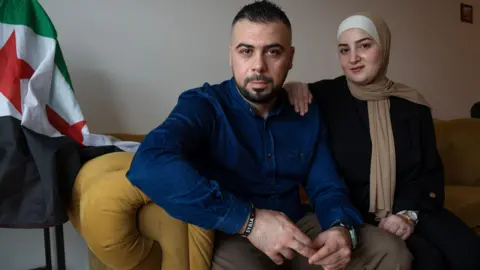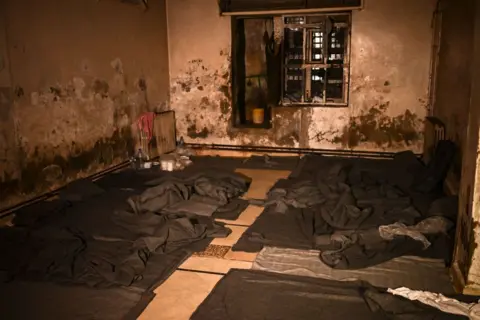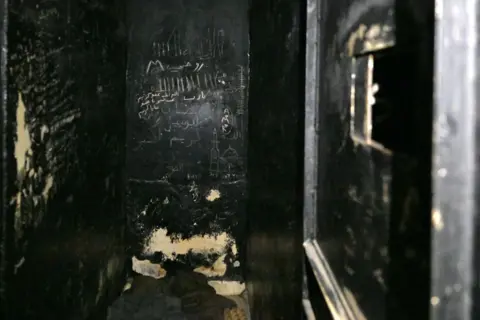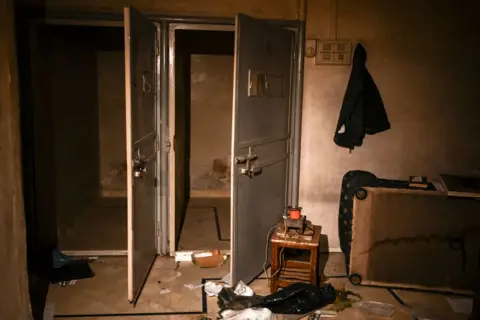
 BBC
BBCIt was early December, when Syrian refugee Donna Haj Ahmed discovered the disturbing details of her husband’s detention in the notorious Al-Khatib prison, known as “Al-Khatib Prison.”Hell on earth“.
She watched distraught prisoners fleeing the country's brutal security services on the news from her home in London, after rebel forces ousted Bashar al-Assad as president.
Abdullah Al-Nawfal, her husband who had sat next to her for eight years, turned and cried and said: “This is the place where I was arrested, this is the place.”
Donna, whose brothers were also detained during Syria's 13-year civil war, says she had an idea of what her husband went through while in detention, but this was the first time he had shared the full details of what he had been exposed to.
 Getty Images
Getty ImagesDonna (33 years old) told the BBC: “Abdullah does not like to share things emotionally. He likes to look like a strong man all the time.”
“It was a turning point. I saw him vulnerable. I saw him crying. I saw him say, 'This is where I've been.' I could be one of them. I could be one of them now, or I could die.”
“I feel like when he saw this, he felt like this (was) closure,” she adds. “Now we want people to hear what the Syrians went through.”
Abdullah (36 years old) was working in Damascus as a store keeper for the International Committee of the Red Cross in July 2013 when he and his colleagues were randomly stopped at a checkpoint on the outskirts of the Syrian capital.
He says he participated in anti-regime protests in 2011 in the southern city of Daraa, where the uprising against Assad began, but quickly distanced himself when rebels began using violence and weapons in response to a brutal crackdown by regime forces.
 Getty Images
Getty ImagesAbdullah was identified at the checkpoint and put on a green bus, handcuffed and blindfolded, and taken to a military zone. He says he was then placed in solitary confinement for three days and beaten.
“It was very dark for three days, I remember,” he says.
“I don't (hear) any sound. It was so dark. You don't hear anything. You feel so alone.”
Abdullah was then transferred to Al-Khatib Detention Center in Damascus, then transferred to a cell containing approximately 130 people.
Al-Khatib was one of several detention facilities run by Syrian intelligence.
Nearly 60,000 people were tortured and killed in prisons run by the Assad regime during the civil war, according to the Syrian Observatory for Human Rights, a UK-based monitoring group.
Two years ago, I found a landmark trial in Germany A Syrian colonel who worked in Al-Khatib is guilty of crimes against humanity. Anwar Raslan (58 years old) was linked to the torture of more than 4,000 people in prison.
In court, witnesses described what the conditions of the detainees were like She was raped and hung from the ceiling For hours, as well as using electric shocks before immersing them in water. Assad's authoritarian government has previously denied accusations of torture.
“Every minute you feel like you're dying”
During his detention in 2013, Abdullah describes how he heard regularly The screams of people being tortured.
He remembers how diseases were widespread, and that about 20 people died while he was detained there.
He told the BBC: “When I started looking around everywhere, there were people standing almost naked.” “They were full of blood, as if they had been tortured.
“If you are not tortured, they will take someone to interrogation every minute.
“They will come back to the room full of blood… Every time you touch someone they will scream because you touched their wound.”
After 12 days, Abdullah was taken for interrogation, where he says he was repeatedly beaten with a metal weapon and accused of transporting the weapons.
He explains that he cannot deny the accusations against him because that would result in a long sentence.
 Getty Images
Getty Images“As long as you say: I didn’t do it, they will continue to torture you and take you to another stage of torture,” he says.
“Every minute you feel like you're dying.”
Abdullah says he told officers a false story to avoid further questioning, and was “lucky” to be released from detention a month later.
A year later, he left Syria and later received a scholarship to Geneva and the United States. He is now settled in London with his wife.
Only now does Abdullah feel able to share the full horror he experienced with his wife, as the dangers and fear he faced slowly disappear.
“We are finally done with the system,” he says, “and we can say, ‘We are truly free now.’”
“You can use our name. You can use our faces. We can tell the whole story.”
Donna, a human rights activist, cried when she heard her husband's experience for the first time.
“I would hear it and I would cry,” she says. “And every time I feel that this regime has reached its maximum level of atrocities and terrible stories.”
“It surprises me that no, that's not the limit. There could be more.”
“We are lucky to be able to tell our stories,” she adds. “So many people died without being heard.”







